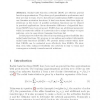Free Online Productivity Tools
i2Speak
i2Symbol
i2OCR
iTex2Img
iWeb2Print
iWeb2Shot
i2Type
iPdf2Split
iPdf2Merge
i2Bopomofo
i2Arabic
i2Style
i2Image
i2PDF
iLatex2Rtf
Sci2ools
ICANN
2007
Springer
2007
Springer
Deformable Radial Basis Functions
Radial basis function networks (RBF) are efficient general function approximators. They show good generalization performance and they are easy to train. Due to theoretical considerations RBFs commonly use Gaussian activation functions. It has been shown that these tight restrictions on the choice of possible activation functions can be relaxed in practical applications. As an alternative difference of sigmoidal functions (SRBF) have been proposed. SRBFs have an additional parameter which increases the ability of a network node to adapt its shape to input patterns, even in cases where Gaussian functions fail. In this paper we follow the idea of incorporating greater flexibility into radial basis functions. We propose to use splines as localized deformable radial basis functions (DRBF). We present initial results which show that DRBFs can be evaluated more effectively then SRBFs. We show that even with enhanced flexibility the network is easy to train and convergences robustly toward...
Related Content
| Added | 08 Jun 2010 |
| Updated | 08 Jun 2010 |
| Type | Conference |
| Year | 2007 |
| Where | ICANN |
| Authors | Wolfgang Hübner, Hanspeter A. Mallot |
Comments (0)

